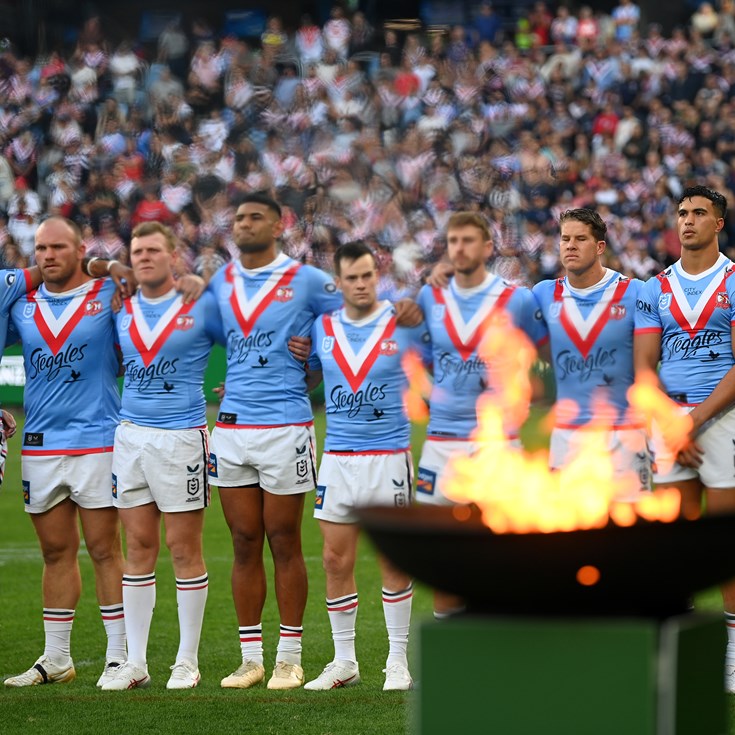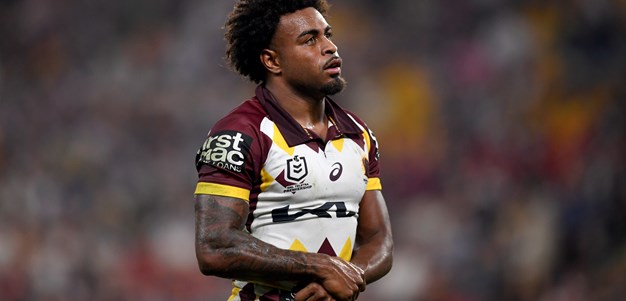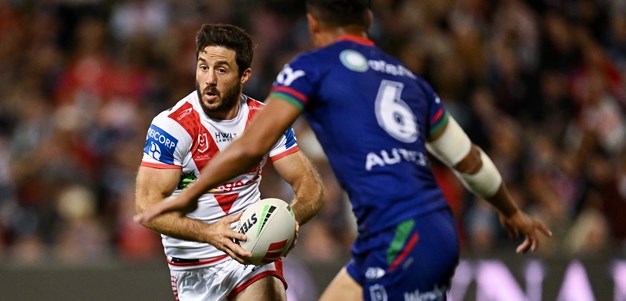Grand Final Day will always have a touch of red and green about it, with the decider’s man of the match award being named in honour of arguably the game’s greatest ever player, Rabbitohs Immortal, Clive Churchill.
The sight of Joyce Churchill (Clive’s wife), proudly presenting the Medal on the Grand Final podium, is without doubt one of the most special aspects of Grand Final Day, recognising not only the skill, determination and courage of those who are awarded it, but those same traits as displayed by Clive himself during an incredible career, played out in the late 1940s and 1950s.
In what must rank among the most astute predictions made by a Rugby League administrator in the game’s history post-war, Henry Jersey Flegg – then President of the NSWRL – watched a 12 year old Churchill play in a Combined Schools match at the Sydney Cricket Ground one afternoon. It is said that Flegg remarked:
“Over there, I see a youngster who wore number six jersey. I predict that one day he will become an International and Captain Australia in Test football.”
Flegg couldn’t have been more correct, for Churchill would go on to play 37 Tests, making five overseas trips, Captaining Australia for six years and playing a record 99 consecutive representative matches – revolutionising fullback play in the process.
Years later, Flegg would follow up his prediction by saying; “Chruchill was the greatest all-round champion the Rugby League code has known.
Indeed, had there been no Dally Messenger before him – commonly referred to as ‘The Master’ – Churchill may well have taken the title himself, but was appointed ‘The Little Master’ in reference to his slight build – a fact that made his footballing feats all the more impressive.
Standing just 171cm tall and weighing 74kg, Churchill was small, even by the standards of the day in the late 1940s-1950s, but his heart on the field, coupled with freakish ingenuity solidified his position as the game’s number one player and as an Immortal.
Whether it was belting much larger forwards in defence and driving them backwards, returning the ball with enterprising running, or kicking goals from impossibly difficult positions, Churchill won South Sydney (and every team he played for) games.
Former Rabbitohs teammate, Bernie Purcell, spoke glowingly of Churchill before his passing.
“I remember one game when he had to retrieve the ball in-goal from a kick with four opposition players chasing him across the line,” recalled Purcell.
“Churchill scooped up the ball and, just when they were about to tackle him in-goal, he wrapped one arm around a goal-post and swung around it full circle.
“The chasers were so mesmerised by the event that they just stood there with their mouths open while Churchill charged back up-field.”
But it would be his incredible courage in 1955 game for Souths that would make him the stuff of legend.
At the halfway point of the season, Souths had lost seven of their first 10 matches to all but dismiss the then defending-Premiers as ‘also-rans’ in 1955 – the Club would need to win every game from that point in order to defend their crown.
With the season winding down, Souths played Manly in a must-win clash, but Churchill broke his wrist in his first tackle of the game, all but rendering the champion Rabbitoh useless with his arm hanging limply by his side. At half-time, Churchill was advised to not continue, but the fullback insisted that he be allowed to go back on despite his obvious discomfort. Souths’ team doctor fashioned a makeshift cast out of an exercise book and sent the Little Master back onto the field in time for Les ‘Chica’ Cowie to score in the corner to make it 7-7.
With his arm hanging limply along with the Rabbitohs’ season, Churchill lined up the shot from the sideline and booted it over to sink Manly 9-7. Souths went on to claim that year’s Premiership.
After concluding his Rabbitohs playing career in 1955, Churchill would return to Redfern in 1967 as a Coach to orchestrate Souths’ next golden era with the aid of some of the greatest name in the Club’s history – John Sattler, Bob McCarthy, Ron Coote to name a few – winning four Premierships in five years between ’67 and ’71.
Churchill passed away in 1985 after a courageous battle with Cancer – his funeral at St Mary’s Cathedral, that featured a coffin draped in a Rabbitohs jersey, drew thousands of mourners.
Souths’ Clive Churchill Medallist – Sam Burgess
While retrospective Medals have been awarded as far back as 1954 – Clive winning the very first one – the medal first saw light in 1986, with Parramatta’s Peter Sterling taking the honour. Since then, a total of four players who have worn the red and green have won a Churchill medal before or during their time at South Sydney (Jim Dymock in 1995 with Canterbury, Greg Inglis in 2007 with Melbourne and Glenn Stewart in 2011 with Manly).
But season 2014 saw Joyce Churchill present the medal for the very first time to a Rabbitohs player in the form of Sam Burgess. In what was an emotional touch of nostalgia, Joyce wore Clive’s red and green pork-pie hat as worn by her husband at Rabbitohs Grand Finals in years gone by in his capacity as Coach, presenting the award to Burgess after a Herculean effort in the 2014 decider.
Channelling the courage of Clive playing with a broken wrist, and Sattler playing with a broken jaw in 1970, Burgess proceeded to play all 80 minutes of the Grand Final against Canterbury with a badly broken cheek-bone and eye-socket. Despite enduring immense pain, the injury wouldn’t deter Burgess, who put in an inspiring Churchill Medal-winning performance to cement his place in Rabbitohs folklore.
Clive Churchill Medallists
1986: Peter Sterling – Parramatta Eels Halfback
1987: Cliff Lyons – Manly-Warringah Sea Eagles Five-eighth
1988: Paul Dunn – Canterbury-Bankstown Bulldogs Prop
1989: Bradley Clyde Canberra Raiders Lock
1990: Ricky Stuart Canberra Raiders Halfback
1991: Bradley Clyde Canberra Raiders Lock
1992: Allan Langer Brisbane Broncos Halfback
1993: Brad Mackay St George Dragons Lock
1994: David Furner Canberra Raiders Second-rower
1995: Jim Dymock Canterbury-Bankstown Bulldogs Lock
1996: Geoff Toovey Manly-Warringah Sea Eagles Halfback
1997: Robbie O'Davis Newcastle Knights Fullback
1998: Gorden Tallis Brisbane Broncos Second-rower
1999: Brett Kimmorley Melbourne Storm Halfback
2000: Darren Lockyer Brisbane Broncos Fullback
2001: Andrew Johns Newcastle Knights Halfback
2002: Craig Fitzgibbon Sydney Roosters Second-rower
2003: Luke Priddis Penrith Panthers Hooker
2004: Willie Mason Bulldogs Prop
2005: Scott Prince Wests Tigers Halfback
2006: Shaun Berrigan Brisbane Broncos Hooker
2007: Greg Inglis Melbourne Storm Five-eighth
2008: Brent Kite Manly-Warringah Sea Eagles Prop
2009: Billy Slater Melbourne Storm Fullback
2010: Darius Boyd St. George Illawarra Dragons Fullback
2011: Glenn Stewart Manly-Warringah Sea Eagles Lock
2012: Cooper Cronk Melbourne Storm Halfback
2013: Daly Cherry-Evans Manly-Warringah Sea Eagles Halfback
2014: Sam Burgess South Sydney Rabbitohs Lock




